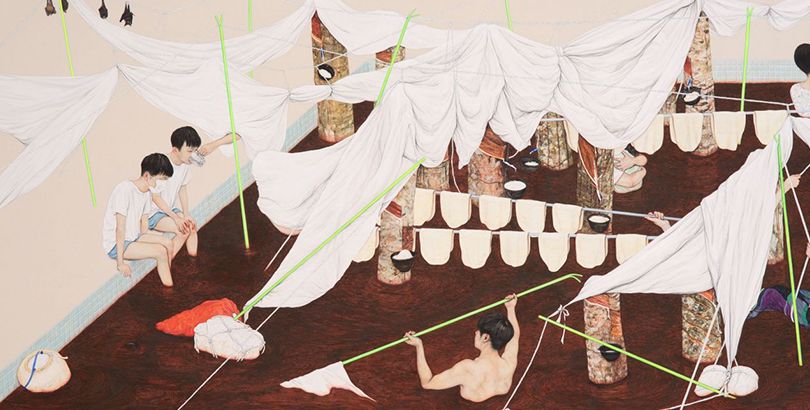UNPERCEIVED: OF THAT WHICH WE STILL DO NO KNOW

Ekta M
The lockdown restricted one’s mobility to a tinier geography, in some cases a room of one’s own. We got involved in certain tasks, in a repetitive fashion. Recently, I stumbled upon a painting titled “unperceived” and it described how much lies in our imagination, dead or alive. The image was not a macabre imagination of the future but did not shy away from a powerful cavity of time that remains unperceived. It may have happened, but we may not have perceived when and how this ‘something’ happened: the act of coping, deciding, remembering and forgetting.
When we speak of representation of labour, a few ideas came back to us with more clarity. They might seem obvious but are useful reminders for the future.
Unless definite, tangible material demands are met in one’s life, it is impractical to expect any other form of change. For instance, housing is one of the most basic needs that remains a never-ending dream for many who have toiled from one generation to the next. Everything in Indiranagar has changed, but in ward 88, the public toilet for the basti is still not functional. People have demanded permanent housing historically. The house is not just scaffolding, tenements, tin sheets or a concrete room without a window; such a place can never become a home. However basic, every person deserves a sense of a home, a place where one has agency over aesthetics. In the way we organise and arrange things, defines autonomy over a way of living. For years now, the phenomenon of ‘adjusting’ has led to unforgiving compromises and unresolved suppressions. The State is aware of this and yet denies it or ‘provides’ it, as mere tokenism, with vested interests. Why should someone doing a Government job be living in a rented house? Let’s be sure, there will be an uprising. Unperceived. Acts of violence will resurface, provoked by unperceived irrational situations and reasons.
Acts of violence will resurface, provoked by unperceived irrational situations and reasons. Because we don’t fully know.

Painting titled “Unperceived” by Lee Jin Ju
Popularly known as crime, theft, violence, suicide. Curing symptoms does not cure the disease of hatred and violence. To expect peace and solidarity is simply unreasonable.
Why do we expect peace, empathy and solidarity when one is surrounded by violence? These virtues may work in an ideal scenario when everything is equal for all subjects. In real life, such a premise does not exist. Displaced violence stays in a child forever. It could return as fatality, nihilism, trauma or violence, on oneself or the other. Laws that curb freedom of expression, restrictions to choose your lover, occupation or God, will lead anyone to take unperceived risks, and to believe otherwise. But when these risks turn into action, the police arrive. There will be blood. Between insiders and outsiders. And perhaps, it’s not just mental illness.
Death is inevitable. As people remember and mourn in their own ways, what is the function of immortality? “The basis of shame is not some personal mistake of ours, but the ignominy, the humiliation we feel that we must be what we are without any choice in the matter, and that this humiliation is seen by everyone.” A quote from Milan Kundera’s immortality, reminds us of dignity at the time of death. When the memory of it looms large around us, we hope to be mindful, in remembering those who have passed, at a spectacularly large scale, together. We could turn to animals for clues, and observe how they behave when they lose one of their own. If there is any time that privacy matters, it is at the time of death.
We hope this issue invites you to observe how time passed through us as we absorbed, withdrew and reacted in this context, to the “unperceived” experience of labour. Because we don’t fully know.
